Codependency Counseling Orlando is a specialized form of therapy that aims to help individuals break free from codependent patterns and develop healthier relationships. It focuses on addressing codependent behaviors, such as excessive caretaking, low self-esteem, and a strong need for approval, to foster self-awareness, boundary-setting, and emotional well-being.
Codependency refers to a dysfunctional pattern of behavior where individuals excessively rely on others for their sense of self-worth and validation. Codependent individuals often struggle with setting boundaries, prioritizing their own needs, and maintaining healthy relationships.
Codependency counseling provides a safe and supportive space for individuals to explore the underlying causes of codependent behavior, gain insight into their relationship patterns, and develop healthier coping mechanisms.
Understanding Codependency: Explore the characteristics and signs of codependency, including people-pleasing, difficulty saying no, and a strong fear of abandonment.
Breaking Codependent Patterns: Discover therapeutic techniques and strategies used in codependency counseling to help individuals develop self-awareness, establish healthy boundaries, and foster autonomy.
Healing from Codependency: Learn about the importance of self-care, self-compassion, and building healthy support systems in the journey towards recovering from codependency.
Cultivating Healthy Relationships: Understand how codependency counseling helps individuals develop healthier relationship dynamics, improve communication skills, and foster interdependence rather than unhealthy dependency.
Codependency counseling aims to help individuals identify and address the underlying issues that contribute to their codependent patterns. Through compassionate and evidence-based approaches, counselors assist individuals in understanding the root causes of codependency, such as childhood trauma, dysfunctional family dynamics, or low self-esteem.
By providing a safe and non-judgmental space, codependency counseling empowers individuals to develop self-awareness, set healthy boundaries, practice self-care, and build fulfilling relationships based on mutual respect and emotional balance.
8 Behaviors: About Codependency Counseling Orlando
| ✅ Codependent Behavior | ✅ Healthy Alternatives |
| ✔ Excessive caretaking | ✔ Encouraging autonomy and allowing others to take responsibility for their own actions and well-being. |
| ✔ Low self-esteem | ✔ Cultivating self-worth through self-compassion and self-validation, rather than seeking validation from others. |
| ✔ Lack of boundaries | ✔ Setting clear boundaries and communicating needs and limits assertively. |
| ✔ Enmeshment | ✔ Fostering healthy independence and recognizing the importance of individual identity and autonomy. |
Key Takeaway
Awareness of Codependency: Codependency counseling helps individuals become aware of their codependent behaviors and understand the impact on their well-being and relationships.
Establishing Boundaries: Codependency counseling focuses on developing healthy boundaries to protect one’s emotional and physical well-being.
Self-Care and Self-Worth: Individuals learn to prioritize self-care, build self-esteem, and cultivate a healthy sense of self-worth.
Interdependence in Relationships: Codependency counseling promotes the development of interdependent relationships based on mutual respect, trust, and individual growth.
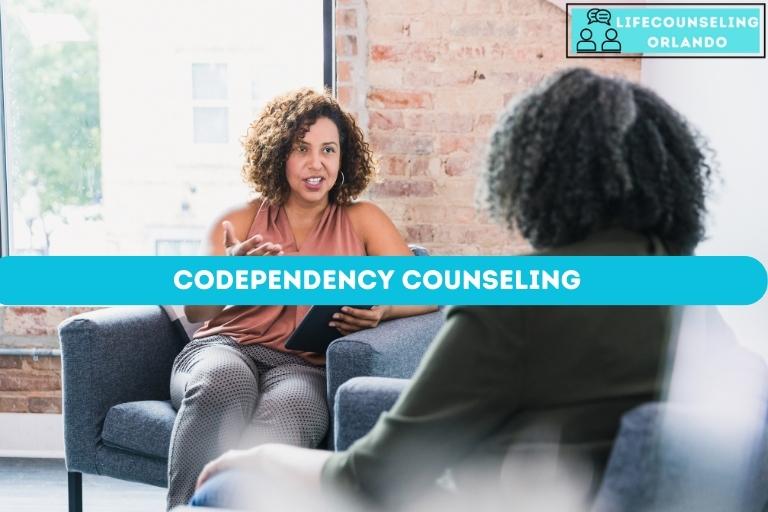
Five Facts About: Codependency Counseling Orlando
Fact 1: Codependency often stems from early life experiences, such as growing up in dysfunctional families or experiencing trauma or neglect.
Fact 2: Codependency can manifest in various forms, including being overly dependent on others, feeling responsible for others’ emotions, and having difficulty expressing one’s own needs.
Fact 3: Codependency can lead to emotional exhaustion,
low self-esteem, and difficulty maintaining healthy relationships.
low self-esteem, and difficulty maintaining healthy relationships.
Fact 4: Codependency counseling incorporates a range of therapeutic techniques, such as cognitive-behavioral therapy, boundary-setting exercises, and inner child work.
Fact 5: Codependency counseling provides individuals with the tools and support they need to break free from codependent patterns, cultivate self-love, and create healthier and more fulfilling relationships.
Codependency Counseling
Codependency Counseling Orlando and the word codependency is a term people throw around today in modern society. We have no real understanding of the severity and harmful affects it has another person.
It is a state of being or condition where a person fixates and focuses on attempting to live through or for another person. Attempts to do so are disguised by manipulation and controlling the others the actions.
There is an obsessive yearning much like that of an addicts urge to use drugs, to take care of another. Thus avoiding focusing on themselves. When the codependent is blocked by attempts to fix others, they will experience intense anxiety. Their whole purpose they believe is to play out the role of the sacrificial caretaker.
This pattern of compulsiveness along with the urge to focus and fixate on others is an attempt to avoid self.
They are unable to see that this comes from a place of fear. This fear results in feelings of control. Attempting to control their outside environment is a way to feel safe for the codependent.
Codependency Counseling Orlando – A Learned Behavior
This is a learned behavior passed down from generation to generation especially in women over past decades. The codependent has learned to develop dysfunctional behaviors in an attempt to survive in a family that is unstable. An environment that is unpredictable and causes tremendous feelings of unrest.
Codependency counseling Orlando is both a behavioral and emotional condition in which a person in a relationship feels that their happiness and self worth depends on another person. Codependents tend to form what can be referred to as “relationship addiction“. Often times it is common to see one partner in the codependent relationship with a drug, alcohol of behavioral addiction.
This is the golden opportunity for the codependent to sweep on in and take over. They feel 100% justifiable in their right to overtake the others life by bombarding, enabling, fixing, planning, controlling, etc. I refer to this as “Giving the Codependent a Job”.
The codependent finds themselves focusing all of their efforts on the other person while their ego is telling them they are “putting their own needs aside”. The exact opposite it true. All attempts under the guise of the self sacrificing codependent is the ultimate form of selfishness and assumes that others are incapable of taking care of themselves and must have them or else they will not “make it”.
Codependency occurs in all types of relationships some more subtle than others.
Low Self Esteem
Many codependents suffer from feelings of low self esteem, They may feel that they need to stay in a toxic relationship even though it is not fulfilling or meeting their emotional needs because they believe that no one else would want them.
The self esteem issues makes the codependent convince themselves that they need to stay in the relationship. To put up with a less than desirable situation because they truly believe they are not good enough. That they are not worthy of a loving relationship.
For example, with an abusive alcoholic and a codependent, the person with low self esteem may feel it is their duty to stay and cater to the needs of the person with addiction and try to” fix” them and their relationship, when in reality they should walk away.
Difficulty Setting Boundaries
Codependents have a difficult time setting boundaries in a relationship. It is difficult to respect others. The codependent may allow others to invade their personal space. They feel they do not have the right to speak up. Their voice and opinions do not matter. They might feel as if they cannot disagree.
This is true when it goes against what the other person in the relationship believes, feels, or thinks. The codependent may not even realize that they have the right to be treated with respect.
Difficulty Owning Own Thoughts and Feelings
The codependent has difficulty owning their own thoughts and feelings. Codependents are continuously focused on the thoughts and needs of someone else. Some spend their life trying so hard to please the other person. The other feeds off of the approval and admiration of others.
In all of this, their own true sense of self gets lost. To the point where the codependent may not even really understand what he or she/he thinks or feels. They seldom focus on themselves.
Difficulty Meeting Own Wants and Needs
The codependent has difficulty owning their own thoughts and feelings. They are continuously focused on the thoughts and needs of someone else. Some spend their life trying so hard to please the other person. The other feeds off of the approval and admiration of others.
The codependents own true sense of self gets lost. To the point where the codependent may not even really understand what he or she/he thinks or feels. They seldom focus on themselves.
- Signs and Characteristics
- Your left feeling responsible for other peoples feelings, choices, wants, needs, etc.
- Trying to please others all the time. Does not take into consideration if you are happy or not.
- Feelings of guilt if someone gives you something.
- Feel angry and victimized even after you do for others without them asking for your help.
- Constantly searching for clues or some concrete proof of alcohol in the home. You are their watch keeper.
- Always trying to prove yourself to others, yet you never feel you measure up.
- Fear of rejection from others frightens you. You seek their approval constantly.
- You are very hard on yourself in regards to how your look, think, feel, & act.
- Blaming yourself for things that are not your fault.
- There is a desperate need for love and affection.
- You lie to yourself that you can fix others.
- Do you yourself saying what you think people want to hear instead of what you truly think?
- You feel guilt for everything.
- The belief that your opinion doesn’t matter to others.
- Lying to protect the ones you love. Covering up and enabling
- You have difficulty expressing your emotions honestly and openly. You have a hard time asking for help.
- Focusing on fixing others gives you a sense of worth and a sense of importance.
If you find that you answer yes to several of the above descriptions seek help for Codependency Counseling Orlando, FL. Learn to start taking care of your own needs. Understand th motives behind why you feel the strong needs to caretaker others. Individual and couples counseling are great method to use.
Call today and let’s start the work to freedom.
Understanding Codependency
What is codependency?
Codependency refers to a behavioral and emotional condition that often develops in relationships where one partner has a substance abuse problem, a mental health issue, or other unhealthy patterns. Codependent individuals tend to be overly reliant on their partner’s approval and validation, often neglecting their own needs and well-being.
This can result in a dysfunctional and imbalanced dynamic within the relationship.
Common signs and symptoms of codependency
1. Excessive care-taking: Codependent individuals often go to great lengths to meet their partner’s needs, even at the expense of their own well-being.
2. Low self-esteem: Codependency is often associated with a lack of self-worth and a constant need for validation from others.
3. Difficulty setting boundaries: Codependent individuals may struggle to establish and enforce healthy boundaries, feeling guilty or anxious when asserting their own needs or desires.
4. Enabling behavior: Codependent individuals may enable their partner’s harmful behaviors, such as substance abuse, by covering up or making excuses for them.
5. Fear of abandonment: Codependent individuals may have an intense fear of being alone or abandoned, leading them to stay in unhealthy relationships.
It is important to recognize these signs and seek professional help if you or someone you know is struggling with codependency. Codependency counseling can provide guidance and support in developing healthier relationship dynamics and fostering personal growth.
Codependency Counseling Approaches
Individual therapy for codependency
Individual therapy is a common approach for addressing codependency. In individual therapy, a trained therapist works one-on-one with the codependent individual to explore their thoughts, emotions, and behaviors.
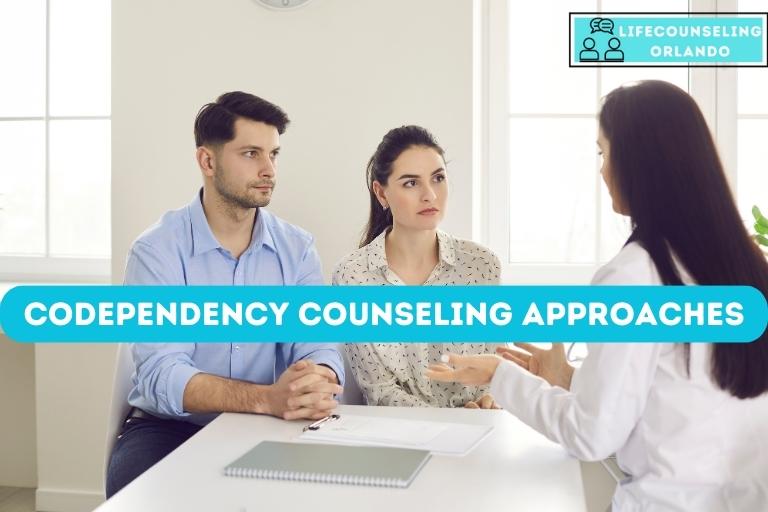
The therapist helps the individual identify and understand the patterns of codependent behavior and works with them to develop healthier coping mechanisms and boundaries. Individual therapy provides a safe and confidential space for the individual to explore their codependency and gain insight into their relationships.
Group therapy for codependency
Group therapy is another effective approach for addressing codependency. In group therapy, individuals with codependency come together in a supportive and non-judgmental environment to share their experiences, learn from one another, and provide support.
Group therapy allows individuals to realize that they are not alone in their struggles and provides a sense of community. It also offers the opportunity to practice new skills and receive feedback from others who may have similar experiences.
Family therapy for codependency
Family therapy is particularly beneficial for individuals whose codependency is rooted in their family dynamics. In family therapy, the therapist works with the entire family system to address the underlying issues that contribute to codependency.
This approach helps family members understand the roles they play in maintaining codependent patterns and develop healthier ways of relating to each other. Family therapy focuses on improving communication, establishing boundaries, and fostering healthier relationships within the family unit.
Codependency counseling approaches vary, and it’s important to find the right approach that suits each individual’s needs. It’s also crucial to seek professional help from a licensed therapist or counselor experienced in working with codependency.
For more information on codependency or to find additional resources.
The Role of Boundaries in Codependency Counseling
Setting healthy boundaries in relationships
In codependency counseling, setting healthy boundaries is a crucial aspect of healing and personal growth. Boundaries define the limits of acceptable behavior and help individuals establish healthy relationships.
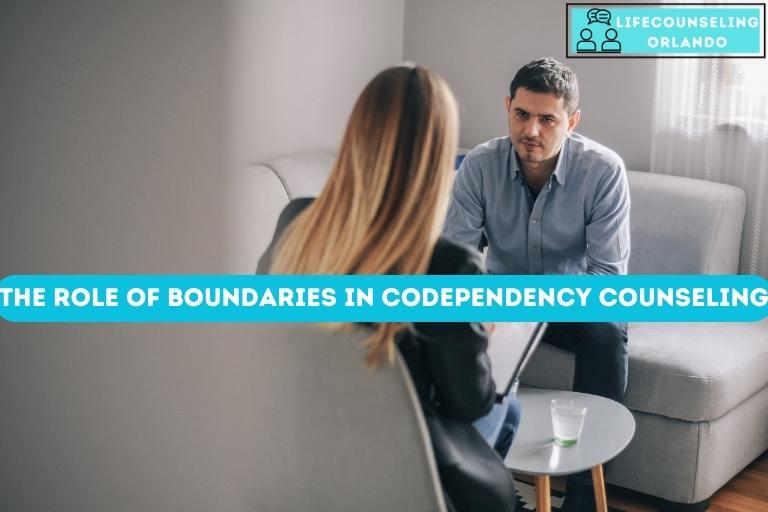
Here are some key points regarding setting healthy boundaries in relationships:
1. Self-awareness: Understanding your needs, values, and limits is essential in setting healthy boundaries. Take time to reflect on your emotions and desires to determine what is acceptable and what is not in your relationships.
2. Communication: Effective communication is key to establishing and maintaining boundaries. Clearly express your needs, expectations, and limits to others, and listen to their concerns as well. Open and honest communication builds trust and understanding.
3. Assertiveness: Being assertive allows you to express your thoughts and feelings while respecting the rights and boundaries of others. Practice assertive communication to ensure that your needs are met and your boundaries are respected.
4. Consistency: Consistently enforcing your boundaries is crucial for maintaining healthy relationships. Stick to your boundaries and do not make exceptions unless you genuinely feel comfortable doing so. Consistency reinforces the importance of your boundaries.
Working through boundary challenges in codependency counseling
In codependency counseling, individuals often face challenges when it comes to establishing and maintaining boundaries.
Here are some common boundary challenges and how they can be addressed in counseling:
• Fear of rejection: Some individuals fear that setting boundaries will result in rejection or abandonment. In counseling, clients can explore the underlying reasons for this fear and develop strategies to overcome it.
• Guilt and people-pleasing tendencies: Codependent individuals often feel guilty when asserting their boundaries or saying no. Counseling can help clients understand the root causes of their people-pleasing tendencies and develop healthier coping mechanisms.
• Boundary violations: Some individuals have experienced repeated boundary violations, leading to difficulty in establishing boundaries. In counseling, clients can work through past traumas and develop strategies for protecting their boundaries.
• Boundaries in intimate relationships: Establishing boundaries with a partner can be challenging. Codependency counseling can help individuals identify unhealthy relationship dynamics and establish mutual boundaries that promote well-being.
In codependency counseling, individuals learn to set healthy boundaries and address boundary challenges through therapy, self-reflection, and practicing new behaviors.
Developing Self-Esteem and Self-Worth in Codependency Counseling
Building self-esteem in codependent individuals
One of the key goals of codependency counseling is to help individuals develop healthy self-esteem and self-worth. When codependent individuals rely on others for their sense of worth and validation, it can lead to a cycle of unhealthy relationships and behaviors.

Here are some strategies that can help build self-esteem in codependent individuals:
Exploring personal values and strengths: Encouraging individuals to identify their own values and strengths can empower them to recognize their unique qualities and potential.
Setting healthy boundaries: Assisting codependent individuals in establishing and maintaining healthy boundaries can help them regain a sense of control and self-respect.
Encouraging self-care: Promoting self-care activities can help codependent individuals prioritize their own well-being and foster a positive sense of self.
Celebrating achievements: Recognizing and celebrating personal achievements, no matter how small, can boost self-esteem and provide a sense of accomplishment.
Identifying and challenging negative self-beliefs
Codependent individuals often have negative self-beliefs that contribute to low self-esteem and feelings of unworthiness. In codependency counseling, therapists help individuals identify and challenge these beliefs.
This may involve:
Cognitive restructuring: Helping individuals recognize and reframe negative thought patterns and replace them with more positive and realistic self-beliefs.
Exploring underlying childhood experiences: Examining past experiences that may have contributed to the development of negative self-beliefs can help individuals gain insight into their patterns of codependency.
Building self-compassion: Encouraging individuals to practice self-compassion can help counteract harsh self-judgments and foster a kinder and more understanding relationship with oneself.
By focusing on developing self-esteem and challenging negative self-beliefs, codependency counseling can help individuals break free from unhealthy patterns and cultivate a healthier sense of self.
Codependency and Addiction
Exploring the connection between codependency and addiction
Codependency and addiction often go hand in hand, creating a complex web of interdependent behaviors and relationships. Codependency refers to a dysfunctional pattern of behavior in which individuals prioritize the needs of others over their own, often at the expense of their own well-being.
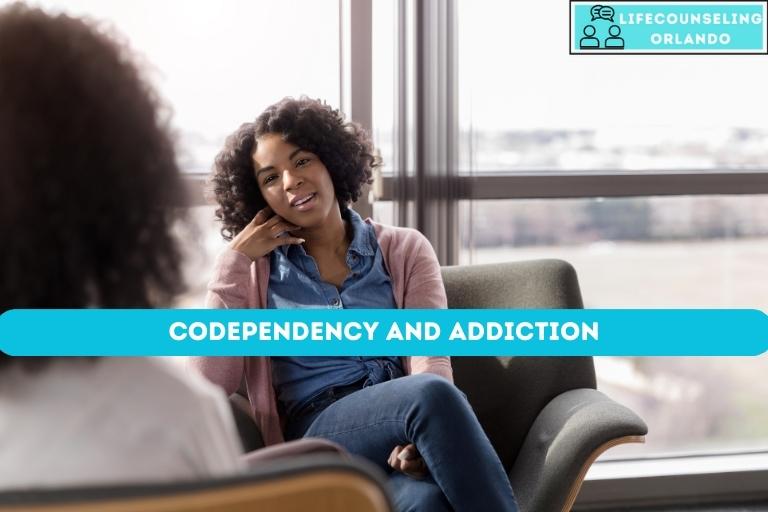
This can lead to feelings of resentment, low self-esteem, and a lack of personal boundaries. Addiction, on the other hand, involves the compulsive use of substances or engagement in certain behaviors despite negative consequences.
The connection between codependency and addiction is multifaceted. Individuals who struggle with codependency often rely on others for a sense of identity and self-worth, making them more susceptible to developing addictive behaviors.
Conversely, those struggling with addiction may rely on codependent relationships to enable or support their addictive behaviors. This toxic cycle reinforces each other’s unhealthy patterns, making it challenging to break free from the cycle of codependency and addiction.
Addressing codependency in addiction counseling
Effective addiction counseling should not only focus on addressing the addictive behaviors but also target the underlying codependent tendencies. By addressing codependency, individuals can develop healthier coping mechanisms, improve self-esteem, and establish boundaries that promote their own well-being.
Some strategies that may be used in codependency counseling for individuals struggling with addiction include:
Education and awareness: Providing individuals with information about codependency and how it relates to addiction can help them gain insight into their own behaviors and motivations.
Individual therapy: One-on-one counseling allows individuals to explore their past experiences, emotions, and relationship patterns that contribute to their codependency and addiction.
Group therapy: Group therapy provides a supportive environment where individuals can share their experiences and learn from others who have similar struggles. It also encourages the development of healthy relationships and communication skills.
Setting boundaries: Learning to set and enforce boundaries is crucial in breaking the cycle of codependency. Counselors can help individuals identify unhealthy relationships and develop strategies for establishing and maintaining boundaries.
Building self-esteem: Codependency often stems from a lack of self-worth. Counseling can help individuals build self-esteem and develop a positive self-image, enabling them to prioritize their own needs and make healthier choices.
By addressing both codependency and addiction concurrently, counselors can help individuals break free from destructive patterns and build healthier, more fulfilling lives.
Codependency and Relationships
Recognizing codependent patterns in relationships
Codependency is a complex issue that affects relationships in various ways. In codependent relationships, one partner may excessively rely on the other for their sense of self-worth and identity.
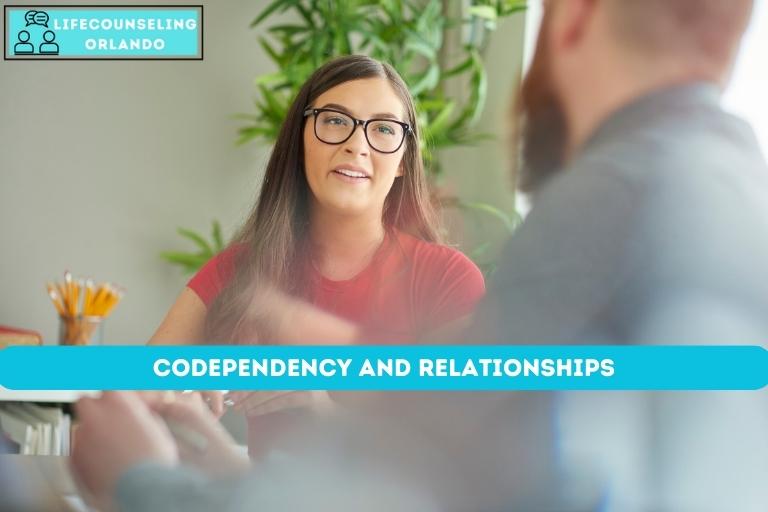
Some common signs of codependent patterns in relationships include:
- Excessive caretaking: One partner constantly puts the needs of the other above their own, often to their own detriment.
- Lack of boundaries: Boundaries become blurred, and one partner may feel responsible for the other’s emotions and behavior.
- Low self-esteem: One partner may have a deep fear of rejection, leading them to seek validation and approval from their partner.
- Difficulty expressing needs and emotions: Codependent individuals may struggle to ask for what they want or express their true feelings, fearing rejection or abandonment.
- Enabling destructive behavior: One partner may enable and make excuses for the other’s harmful behaviors, such as addiction or emotional abuse.
Improving communication and fostering healthy relationships in codependency counseling
Codependency counseling aims to help individuals recognize and break free from codependent patterns in their relationships.
Some strategies that may be employed include:
- Learning to set boundaries: Clients are taught to establish clear boundaries in their relationships and prioritize their own well-being.
- Enhancing self-esteem: Therapists work with clients to improve self-esteem and self-worth, helping them develop a strong sense of identity outside of their relationships.
- Assertive communication: Clients learn to express their needs and emotions effectively, improving communication within their relationships.
- Developing healthy coping mechanisms: Therapists help clients identify and practice healthy coping strategies to manage stress, anxiety, and difficult emotions.
- Nurturing self-care: Clients are encouraged to prioritize self-care activities that promote their physical, emotional, and mental well-being.
- Developing support networks: Therapists assist clients in establishing healthy support networks outside of their codependent relationships, providing them with additional sources of validation and support.
Codependency counseling focuses on empowering individuals to build healthy and balanced relationships, where both partners can thrive independently and interdependently. It is a transformative process that can lead to personal growth and greater emotional well-being.
Codependency Recovery Tools and Techniques
Practical strategies for coping with codependency
Recovering from codependency requires a combination of self-reflection, support, and practical strategies to break old patterns and build healthier relationships.
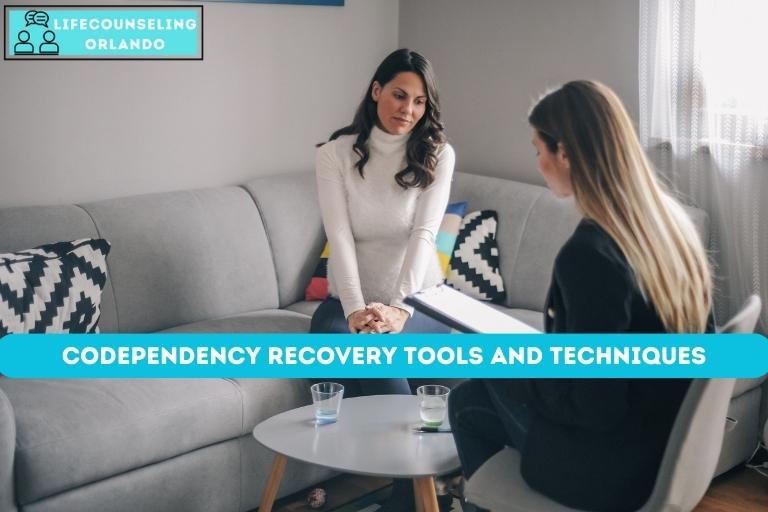
Here are some tools and techniques that can be helpful in codependency counseling:
1. Setting boundaries: Learning to set and communicate boundaries is essential in overcoming codependency. This includes learning to say no, expressing your needs and wants, and recognizing when others may be crossing your boundaries.
2. Developing self-awareness: Increasing self-awareness is crucial for understanding codependent behaviors and patterns. This can be done through journaling, therapy, or support groups where you can explore triggers, emotions, and underlying beliefs.
3. Building self-esteem: Developing a positive self-image and building self-esteem are important aspects of codependency recovery. This may involve practicing self-care, engaging in activities that bring joy, and challenging negative self-talk.
4. Seeking support: Joining a support group or seeking individual therapy can provide a safe space to share experiences and receive guidance from others who have gone through similar struggles. It can also be helpful to have a therapist who specializes in codependency to guide you through the recovery process.
Mindfulness and self-care in codependency counseling
In codependency counseling, incorporating mindfulness and self-care practices can be transformative in breaking codependent patterns.
Here are some techniques to consider:
• Mindful breathing: Taking time to focus on your breath and bring awareness to the present moment can help reduce stress and anxiety. This can be done through guided meditations or simply taking a few minutes each day to practice deep, intentional breathing.
• Self-compassion: Practicing self-compassion involves treating yourself with kindness, understanding, and acceptance. This means recognizing that you are not alone in your struggles and offering yourself the same care and support you would give to others.
• Journaling: Writing down your thoughts and emotions can be a powerful tool in self-reflection and self-discovery. Journaling can help identify patterns, track progress, and gain insights into your thoughts and behaviors.
• Healthy coping mechanisms: Engaging in activities that promote self-care and well-being is crucial in codependency recovery. This can include hobbies, exercise, spending time with loved ones, or seeking professional help when needed.
By incorporating these tools and techniques into codependency counseling, individuals can begin to break free from codependent patterns and build healthier, more fulfilling relationships with themselves and others.
Working Through Enabling Behaviors in Codependency Counseling
Understanding enabling behaviors in codependency
Codependency often involves enabling behaviors, where one person enables and supports the destructive behaviors of another. These enabling behaviors can perpetuate the cycle of codependency and prevent healthy growth and change.
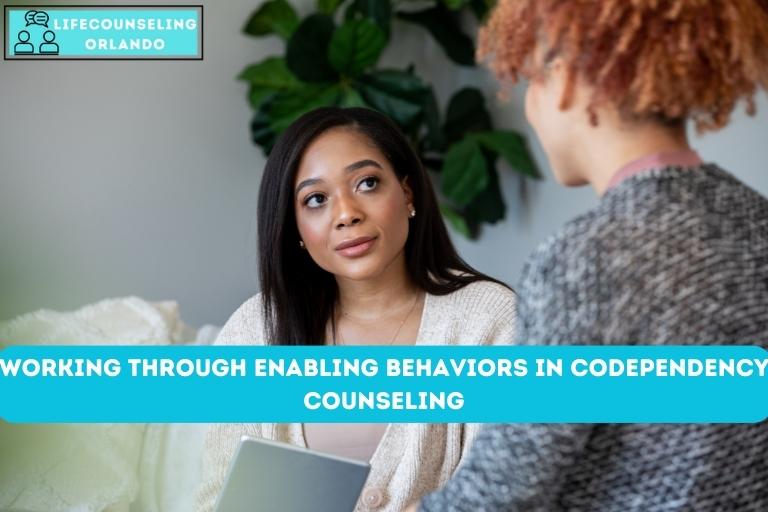
It is important to understand enabling behaviors to address them effectively in codependency counseling.
Some common enabling behaviors include:
1. Protecting: Acting as a shield for the codependent individual, protecting them from the consequences of their actions.
2. Fixing: Taking responsibility for the codependent individual’s problems and trying to solve them for them.
3. Rescuing: Constantly coming to the rescue and bailing the codependent individual out of difficult situations.
4. Denying: Ignoring or downplaying the codependent individual’s destructive behaviors or refusing to acknowledge the reality of the situation.
Developing effective strategies for breaking enabling patterns
In codependency counseling, therapists work with individuals to develop effective strategies for breaking enabling patterns.
Some strategies include:
1. Self-awareness: Becoming aware of one’s own enabling behaviors and understanding the role they play in perpetuating codependency.
2. Setting boundaries: Establishing clear boundaries and limits with the codependent individual, and sticking to them consistently.
3. Encouraging personal responsibility: Encouraging the codependent individual to take responsibility for their own actions and decisions, and supporting their growth and change.
4. Focusing on self-care: Encouraging the individual to prioritize their own well-being and self-care, and understanding that they are not responsible for the happiness or success of the codependent individual.
By working through enabling behaviors, individuals can break free from codependent patterns and establish healthier relationships. Remember, seeking professional help from a therapist or counselor is crucial in the process of codependency recovery.
Codependency in Family Systems
Exploring codependency dynamics in families
Codependency is a common issue that can affect families, causing individuals to develop unhealthy relationship patterns and behaviors. It is important to understand the dynamics of codependency in order to address and overcome these patterns.
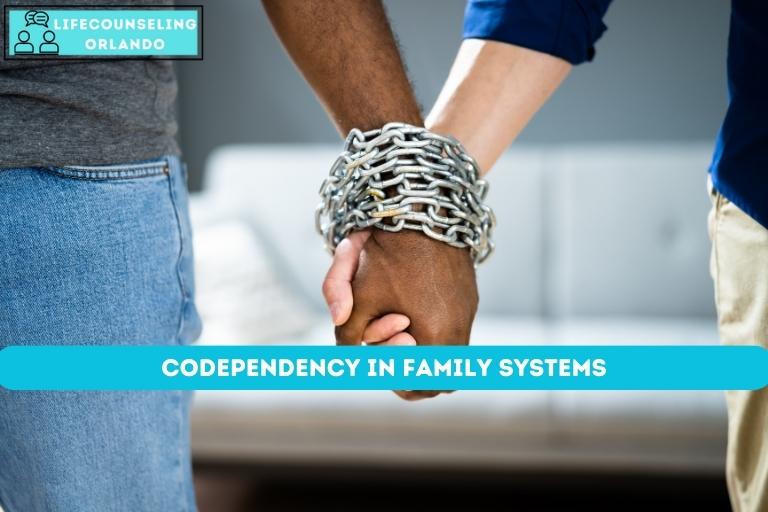
Here are some key aspects to consider when exploring codependency in family systems:
Enabling Behavior: Codependency often involves enabling behavior, where one family member enables and supports unhealthy behaviors or addictions of another family member. This can perpetuate a cycle of dysfunction and prevent individuals from taking responsibility for their actions.
Lack of Boundaries: Codependent family systems often lack clear boundaries, resulting in blurred roles and responsibilities. Boundaries help maintain a healthy balance between the needs and wants of individuals within the family.
Low Self-Esteem: Codependency can contribute to low self-esteem, as individuals may base their self-worth on their ability to meet the needs of others. This can lead to a lack of self-care and a neglect of personal goals and desires.
Poor Communication: In codependent families, communication tends to be ineffective and often revolves around maintaining control or avoiding conflict. This can hinder the development of healthy relationships and problem-solving skills.
Difficulty Expressing Emotions: Codependency can make it challenging for individuals to express their authentic emotions and needs. This may result in resentment, anger, and a lack of emotional intimacy within the family.
Understanding these dynamics is essential for addressing codependency in family systems. Counseling and therapy can provide individuals and families with the tools and support they need to break free from codependent patterns and foster healthier relationships. To learn more about codependency and its impact on families.
Codependency and Boundary-less Friendships
Recognizing codependency dynamics in friendships
Codependency is a common issue that can affect any type of relationship, including friendships. It occurs when one person becomes overly reliant on the other for their emotional well-being, often sacrificing their own needs and boundaries in the process.
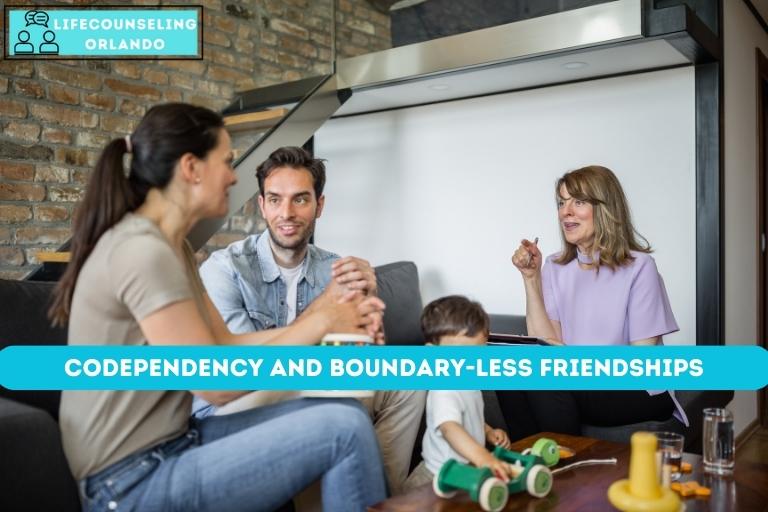
Here are some signs of codependency in friendships:
- Difficulty saying no or setting boundaries
- Feeling responsible for the other person’s happiness and well-being
- Neglecting one’s own needs in order to please the other person
- Feeding off of each other’s emotions and becoming enmeshed
- High levels of dependency and fear of abandonment
Establishing boundaries and fostering healthier friendships
It is crucial to establish healthy boundaries in friendships in order to promote independence and maintain a balanced dynamic. Here are some tips for fostering healthier friendships:
- Practice self-awareness: Recognize your own needs, emotions, and boundaries.
- Communicate openly: Discuss and negotiate boundaries with your friend to ensure that both parties feel respected and heard.
- Learn to say no: It is important to prioritize your own well-being and understand that it is okay to say no when necessary.
- Seek support: Consider seeking professional help, such as codependency counseling, to address and overcome codependent patterns in your friendships.
By recognizing codependent dynamics and actively working towards establishing boundaries, you can foster healthier and more fulfilling friendships.
FAQ of Codependency Counseling
What is codependency?
Codependency is a psychological condition where individuals develop unhealthy, excessive reliance on others for emotional and psychological needs, often at the expense of their own well-being. It frequently involves enabling and controlling behaviors in relationships, leading to a lack of autonomy and boundary-setting.
How does codependency impact relationships?
Codependency can have detrimental effects on relationships, leading to a cycle of dysfunction and emotional distress. It may result in an imbalance of power and an inability to establish healthy boundaries. Partners may become enmeshed and lose their sense of individuality, creating a co-reliant dynamic that hinders personal growth and fosters resentment.
Can codependency be treated effectively?
Yes, codependency can be treated effectively through counseling and therapy. A skilled therapist can help individuals identify the root causes of their codependent behaviors, address underlying issues, and learn healthier coping mechanisms. Cognitive-behavioral therapy (CBT) and dialectical behavior therapy (DBT) are often employed in codependency counseling to promote positive change.
Is codependency solely related to romantic relationships?
No, codependency can manifest in various types of relationships, not just romantic ones. It can be present in family dynamics, friendships, and even work relationships. Addressing codependency issues can lead to healthier interactions across all spheres of life, improving overall well-being and self-awareness.
Summary
In conclusion, codependency is a complex and challenging issue that can deeply impact individuals and their relationships. Recognizing the signs of codependency is crucial in seeking help and support for those affected. Through codependency counseling, individuals can gain insight into their behavioral patterns, explore the root causes of their codependent tendencies, and learn healthier ways to relate to others.
Counseling offers a safe space for self-exploration and personal growth, empowering individuals to establish boundaries, prioritize self-care, and foster healthier connections. By addressing codependency, not only can romantic relationships improve, but also familial, social, and professional relationships can become more fulfilling and balanced.
Remember, reaching out for professional assistance is a strength, not a weakness. With the right guidance and tools, individuals can break free from codependency’s grip, embrace their individuality, and build more authentic and satisfying connections with others. Taking the first step towards counseling can lead to transformative change and a brighter, more emotionally resilient future.
